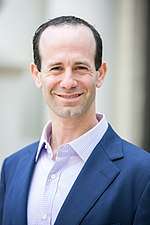Benjamin Gordon (businessman)
Benjamin Gordon (born September 11, 1973) is an American entrepreneur who founds, advises, and invests in supply chain companies. He serves as CEO and Managing Partner of BG Strategic Advisors and Cambridge Capital, companies he founded. He lives in Palm Beach, Florida.
Benjamin Gordon | |
|---|---|
 Benjamin Gordon | |
| Born | September 11, 1973 |
| Occupation | Entrepreneur & investor |
Early life and education
Gordon was born in Ann Arbor, Michigan, and grew up in Philadelphia, Pennsylvania. He earned a Bachelor of Arts degree from Yale College and an MBA degree from Harvard Business School. Transport and logistics ran in Gordon's family. In 1904, his great-grandfather started a New York-based horse-and-buggy business, and his grandfather founded a truck-leasing business in New England where he had worked summers.[1]
In 1999, while at HBS, he and classmate Tania Yannas founded 3Plex, recognized as one the early internet logistics companies, with The New York Times crediting Gordon for imagining "a business-to-business Web site that would allow shipping agents to communicate better with both truckers and shippers."[1] Business Week cited Gordon among early entrepreneurs using the web to "streamline the consolidation and outsourcing of freight trucking", noting that the 26-year-old's fledgling business had attracted $15 million in venture financing.[2] In 2000, their company was a finalist in the HBS New Venture Competition.[3]
Career
Gordon served as CEO of 3PLex from its inception, leading the company through three rounds of fundraising totaling $28 million from investors which included Morgan Stanley, Goldman Sachs, BancBoston Ventures, CNF, and Ionian. The company was acquired by Maersk in 2002.[4]
In 2002, Gordon founded BG Strategic Advisors (BGSA), an investment banking firm focused on mergers and acquisitions in the transportation, logistics, and supply chain sectors. BGSA hosts an annual conference of supply chain and logistics executives in West Palm Beach, Florida.[5]
In 2009, Gordon founded Cambridge Capital, which focuses on investments in logistics and supply chain companies. The company's noteworthy investments include XPO Logistics, Grand Junction (an e-commerce and last-mile logistics technology company sold to Target), and Bringg (an ecommerce and last-mile logistics technology company[6]).[7]
Also in 2009, Gordon founded EcoSquid, an e-commerce marketplace enabling consumers to resell or recycle their used electronics.[8] In 2012, the company was sold to uSell.[9]
Recognition by business media
Gordon has appeared frequently as a commentator and analyst on CNBC.[10][11][12] He has been quoted as an expert on supply chain management, logistics, technology, and investment issues in The Wall Street Journal,[13] The New York Times,[1] Bloomberg,[2] Forbes,[14] Fox Business,[15] and Authority.[16] He has authored articles published in Fortune,[17] CNBC,[18] and various supply chain industry publications, such as Supply Chain Management Review[19] and Freightwaves.[20] He has also been interviewed as an authority on corporate governance by CorpGov in the wake of the failed WeWork IPO, published in Yahoo! Finance.[21]
Social entrepreneurship and philanthropy
In 1997, Gordon founded GesherCity, a non-profit that connects young adults to Jewish communities through online and in-person experiences. One of the first social networks that allowed people to create online communities based on self-selected categories, by 2007 the project scaled up to 20 cities and 100,000 members before merging into the Jewish Community Center Association,[22] as recognized repeatedly in the JCCA's annual report for that year[23] and Jewish community media.[24]
References
- Leonhardt, David (2000-06-18). "A Little Start-Up Gets a Big Push". The New York Times. ISSN 0362-4331. Retrieved 2019-10-15.
- Salkever, Alex (12 June 2000). "Bloomberg - Making Sure Big Rigs Have Something to Carry". www.bloomberg.com. Retrieved 2019-09-04.
- "Harvard Business School New Venture Competition Winners and Success Stories". Harvard Business School. Retrieved 26 August 2019.
- "3PLex.com Company Profile: Acquisition & Investors | PitchBook". pitchbook.com. Retrieved 2019-10-15.
- "Home". Supply Chain Conference 2020. Retrieved 2019-10-15.
- "Bringg raises $25 million to facilitate last-mile deliveries". VentureBeat. 2019-01-15. Retrieved 2019-10-15.
- "Profile of Cambridge Capital". Crunchbase. Retrieved 15 October 2019.
- Finger, Richard. "Sell Your Smart Phone Quickly And Easily: An Alternative To eBay". Forbes. Retrieved 2019-10-15.
- Inc, Upstream Worldwide (2011-07-26). "uSell and EcoSquid Merge to Form a Leading Cash Commerce Platform". GlobeNewswire News Room. Retrieved 2019-10-15.
- Lawrence Delevingne (20 August 2014). "How Big Investors are Shaping the (Boring) Future of Competition". CNBC. Retrieved 24 August 2019.
- "Transportation: a Window into the Economy". CNBC. 10 December 2014. Retrieved 24 August 2019.
- "What Transports are Telling Us About the Economy". CNBC. 5 February 2015. Retrieved 24 August 2019.
- "Private Equity Firms Buy Trucking Freight Services Companies". Wall Street Journal. 3 April 2019. Retrieved 24 August 2019.
- Cohan, Peter (29 August 2019). "What Amazon's One-Day Delivery Means for UPS, FedEx, Walmart and Target". Forbes. Retrieved 2019-09-04.
- "Amazon's Deal for Whole Foods Seen as Ideal for Urban Pickup and Delivery Hubs". Dow Jones Newswires. 2017-06-17. Retrieved 2019-10-15.
- Martinetti, Carly (2019-09-03). "5 Things I Wish Someone Told Me Before I Became the CEO of Cambridge Capital, with Benjamin Gordon". Medium. Retrieved 2019-09-04.
- Benjamin Gordon and Andrea Vandersall (15 February 2017). "Here's How Corporate Giants Are Holding Off Disrupters". Fortune. Retrieved 24 August 2019.
- Benjamin Gordon, managing partner of BG Strategic Advisors (2015-02-05). "What transports are telling us about the economy—commentary". www.cnbc.com. Retrieved 2019-09-12.
- "BGSA Supply Chain Conference Takeaways". Supply Chain Management Review. 19 April 2019. Retrieved 26 August 2019.
- "From Freight 2025: "On Disruption in Logistics"". Freightwaves. 20 July 2018. Retrieved 26 August 2019.
- "Cambridge Capital's Gordon: After WeWork Debacle, Tech Firms to Take Governance Seriously". finance.yahoo.com. Retrieved 2019-10-15.
- "JCC Association of North America". Retrieved 2019-08-26.
- "Annual Report 2007". Issuu. Retrieved 2019-10-15.
- "Jewish Herald-Voice". jhvonline.com. Retrieved 2019-10-15.